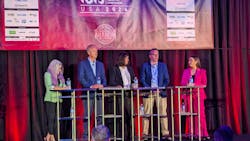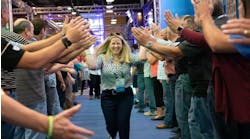IBIS CEO Jason Moseley kicked off the 2024 IBIS USA event by introducing the year’s theme, “Transforming tomorrow together.” He then took a poll of the crowd, asking them how they felt about the state of the collision repair industry.
More than three quarters of those in the crowd said the industry is progressing, but too slowly.
Moseley said that this outlook fit the theme well, and his goal for the event was to get collision repair stakeholders to start thinking differently to make change for the future. Sometimes the conversations can get challenging.
“I think it’s only in those moments that we can really effect real change,” Moseley said.
IBIS USA 2024 is the second in a string of symposiums for the organization, which has a global reach. The first IBIS event of 2024 took place in Dubai in February. The USA event in March was held in Anaheim, California, and brought together leading shop owners, as well as representatives from training organizations, suppliers, and other vendors.
Recruiting for Tomorrow
The first full discussion at the symposium revolved around the various recruiting efforts being done for the collision repair industry and the various organizations that work to bring more young people into the business. Often, these organizations work in concert.
The panel discussion featured Molly Mahoney, national marketing and engagement director at the Collision Engineering Program; Brandon Eckenrode, executive director of the Collision Repair Education Foundation; Jennifer Maher, CEO of TechForce Foundation; Dara Goroff, vice president, planning and industry talent programming at I-CAR; and Erick Bickett, director of the Collision Career Institute.
The discussion centered around the potential demand for collision repair technicians. Maher cited the figure of 100,000 technicians needed over the next five years to keep up with demand.
But she also pointed out that it’s a competitive field in trades.
“If you’re going to solve the problem, you have to look at the entire problem, and the technician shortage touches all sectors,” she said.
All areas of automotive repair are in need of technicians, from general repair to fleet maintenance to diesel work. And when a prospective student is interested in “automotive” as a general area of work, most often they’re directed toward mechanical repair.
Goroff said that the Collision Careers platform at I-CAR is working to help students visualize themselves in a collision repair field.
“We truly want people to be able to picture themselves doing the job in a place where they can work today,” Goroff said.
That means putting successful career pathways in front of students and showing what working in the collision repair field actually looks like. Generating interest is a key first step.
There is renewed interest in the trades and in trade school education, Eckenrode said. He cited two schools in Illinois that were able to restart automotive programs based on this interest. But he pointed out that this was done through the assistance and engagement with industry partners.
This was a big part of the discussion. Everyone on the panel urged shop owners, vendor partners, and other stakeholders to get involved in promoting the field of work and helping to make their regional trade schools successful.
“We’re going to need a larger funnel,” Bickett said. “Because frankly, we’re going to need a good sample to get the right aptitude.”
Becoming an In-Demand Employer
Another panel discussion at IBIS USA brought together representatives from multi-country MSOs and smaller independent operations to talk about what makes a company attractive to employees.
This engaging panel included Jason Hope, vice president of business development and strategic projects for The Boyd Group; Sabrina Thring, brand president, Driven Brands Collision Group; Jay Hayward, senior vice president of operation, CSN Collision; Jason Scharton, senior manager, global expertise delivery, 3M Collision; Matt Ebert, founder and CEO, Crash Champions; and Melanie Allan, vice president, Craftsman Collision USA.
Hope said that The Boyd Group network has grown a lot, and they’ve focused on training leaders within the ranks of the company. He said it’s about creating the right environment for long-term success, and that it might mean learning some lessons from smaller operators.
“A lot of the independents might pay a little bit less. They may not have all the exit interviews and all this process in place, but they don’t lose people,” Hope said. “And I think there’s a lot to learn from those individuals.”
While most panel participants represented large MSOs or suppliers, Allan spoke from a smaller independent perspective. Allan said that Craftsman Collision USA, which is based in Long Beach, California, doesn’t have a retention problem.
“There's a lot of things that we do in our shop that we can keep at a granular level that I can be flexible about,” she said.
The smaller scale means being able to celebrate individuals in the company. It’s a place where leadership engages the staff daily and creates competitions around KPIs. They have many social events to build the team.
“For retention, that goes a huge way,” Allan said.
But these are qualities that the larger networks want to build as well. Thring, who leads the Driven Brands collision portfolio, said that she’s learning a lot from franchise partners about how they make those personal impacts at the franchise level. She said she recently met a technician and asked why that person had stayed with the company. It was the integrity.
“One of the things she told me was that when she started, she couldn’t really afford to invest in tools,” Thring said. “Each technician in the shop donated a tool to her toolbox.”
For the large MSOs, it can be tough to standardize culture across hundreds of locations. Ebert said that twice in recent years, Crash Champions made acquisitions that were bigger than the company before the acquisition. He’s tried to foster an adaptive and dynamic culture that can incorporate all the new ideas and personnel coming on board.
“Everything we do is geared toward improving the people that we have,” Ebert said. “From a leadership perspective, if you don't have the right leadership, good people are going to leave.”





